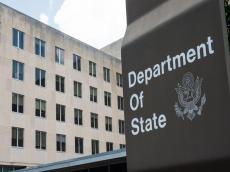|
|
TODAY.AZ / World news
US says gaps remain in Iran nuclear deal but pact closer than before
24 August 2022 [08:15] - TODAY.AZ

By Trend
The US continues to review the European Union’s latest proposed deal to curb Iran’s nuclear program, saying it’s encouraged that some key demands have been dropped, Trend reports citing Al Arabiya.
The Biden administration will respond at an appropriate time, a US official said Monday, adding that delays by Iran have stretched on for months, and any suggestion the US is now delaying the process is false.
The official said the US sees it as a positive sign that Iran appears to have dropped some of its demands, such as lifting the Islamic Revolutionary Guard Corps’ designation by the US as a foreign terrorist organization.
The EU proposal is the latest in the back-and forth over talks for a new deal, after the previous pact collapsed in the aftermath of former President Donald Trump’s decision in 2018 to pull the US out.
Stakeholders have been watching closely for a US response to the EU since Iran delivered its comments a week ago. World powers have spent almost 18 months trying a broker an agreement that would reinstate strict limits on Iran’s atomic activity in exchange for the easing of US sanctions on the Islamic Republic’s economy, including its oil exports.
The US is still studying the revised text, according to the official, who spoke on condition of anonymity as the review continues. A deal is closer than it was two weeks ago, but the outcome remains uncertain as some gaps remain and some outstanding issues must still be resolved, the US official said.
NSC Spokeswoman Adrienne Watson said in a statement that the US is not considering new offers to sweeten the pot for Iran.
“Reports that we have accepted or are considering new concessions to Iran as part of reentering the 2015 nuclear deal are categorically false,” Watson said in a statement.
Iran sent a “reasonable response to the EU’s latest proposal for saving the 2015 nuclear accord, and diplomats might meet this week in Vienna to discuss the next steps,” the bloc’s foreign-policy chief, Josep Borrell, said Monday. The bloc is awaiting the US response.
“I hope that this response allows us to end the negotiations,” Borrell said of the anticipated comments from Washington, without elaborating on the remaining gaps that had to be bridged. “That’s my hope, but I cannot assure you that this will happen.”
President Joe Biden spoke with counterparts in France, Germany and the UK on Sunday about the talks. All four countries were signatories to the original deal, known as the JCPOA. The leaders discussed “the need to strengthen support for partners in the Middle East region,” according to a US summary of the call.
URL: http://www.today.az/news/regions/224513.html
 Print version
Print version
Connect with us. Get latest news and updates.
See Also
- 18 November 2024 [13:23]
Pashinyan confirms high-profile resignations in Armenian government - 17 November 2024 [23:21]
Taiwan Foreign Minister leads drone tech delegation to Lithuania - 17 November 2024 [22:27]
Xi Jinping seeks stable US-China relations ahead of Trump’s return to office - 17 November 2024 [21:30]
Australia, Japan, and US strengthen military cooperation to counter China - 17 November 2024 [20:34]
Trump appoints fossil fuel Executive Chris Wright as Energy Secretary in second term - 17 November 2024 [19:20]
Voting begins in Senegal’s early Parliamentary Elections for New National Assembly - 17 November 2024 [16:45]
WFP's Martin Fricke: Climate change impacts are happening faster than expected - 17 November 2024 [08:30]
Chinese-made innovative drugs hit 100-billion-yuan market scale - 17 November 2024 [08:00]
China and EU reach ‘technical consensus’ in recent EV talks: media report - 16 November 2024 [23:20]
World's largest coral reef discovered in Pacific Ocean
Most Popular
 Azerbaijan and COP29: a real approach and an example for everyone
Azerbaijan and COP29: a real approach and an example for everyone
 Macron received a slap in the face from the Vatican
Macron received a slap in the face from the Vatican
 Baku made Paris panic. What was Macron afraid of?
Baku made Paris panic. What was Macron afraid of?
 Pashinyan's allegation augurs Armenia's deviation from peace talks
Pashinyan's allegation augurs Armenia's deviation from peace talks
 Azerbaijani activists protest U.S. Congressman Frank Pallone, demand apology and legal action
Azerbaijani activists protest U.S. Congressman Frank Pallone, demand apology and legal action
 Azerbaijan, UN Office on Drug & Crime mull coop in combating transnational crime
Azerbaijan, UN Office on Drug & Crime mull coop in combating transnational crime
 Iran prepares to treat women who violate hijab law
Iran prepares to treat women who violate hijab law
